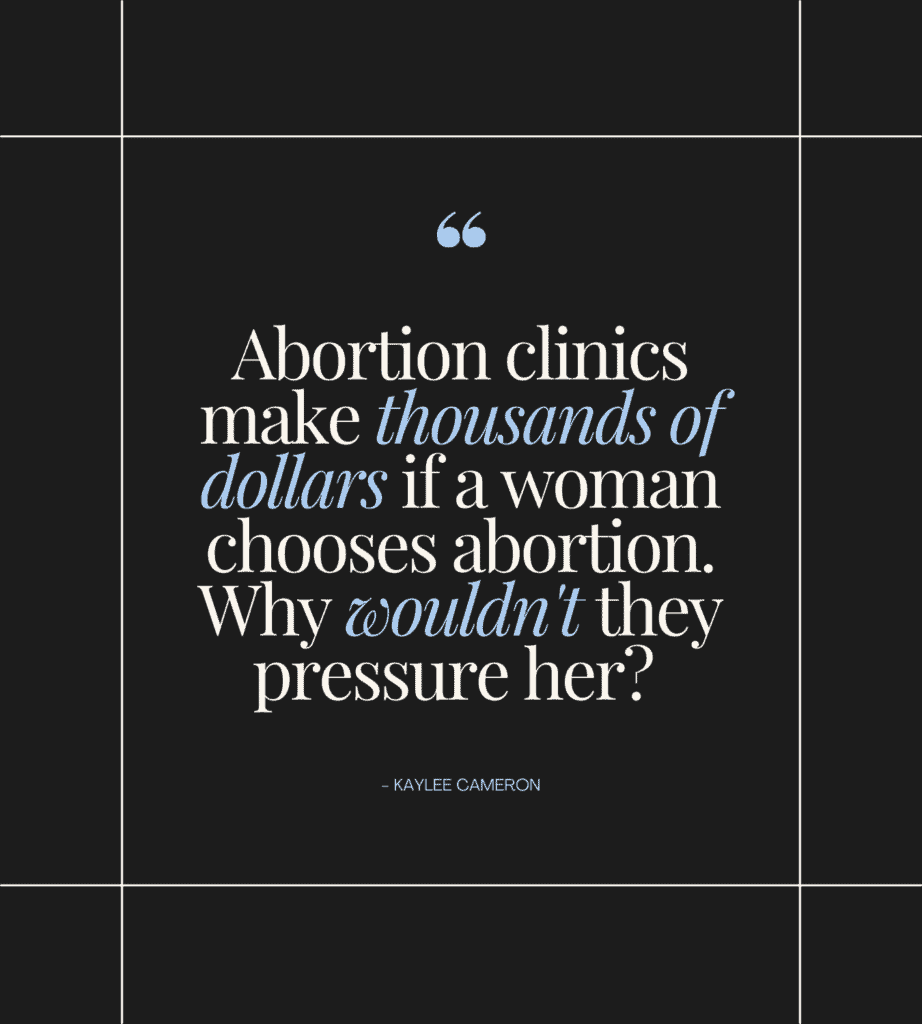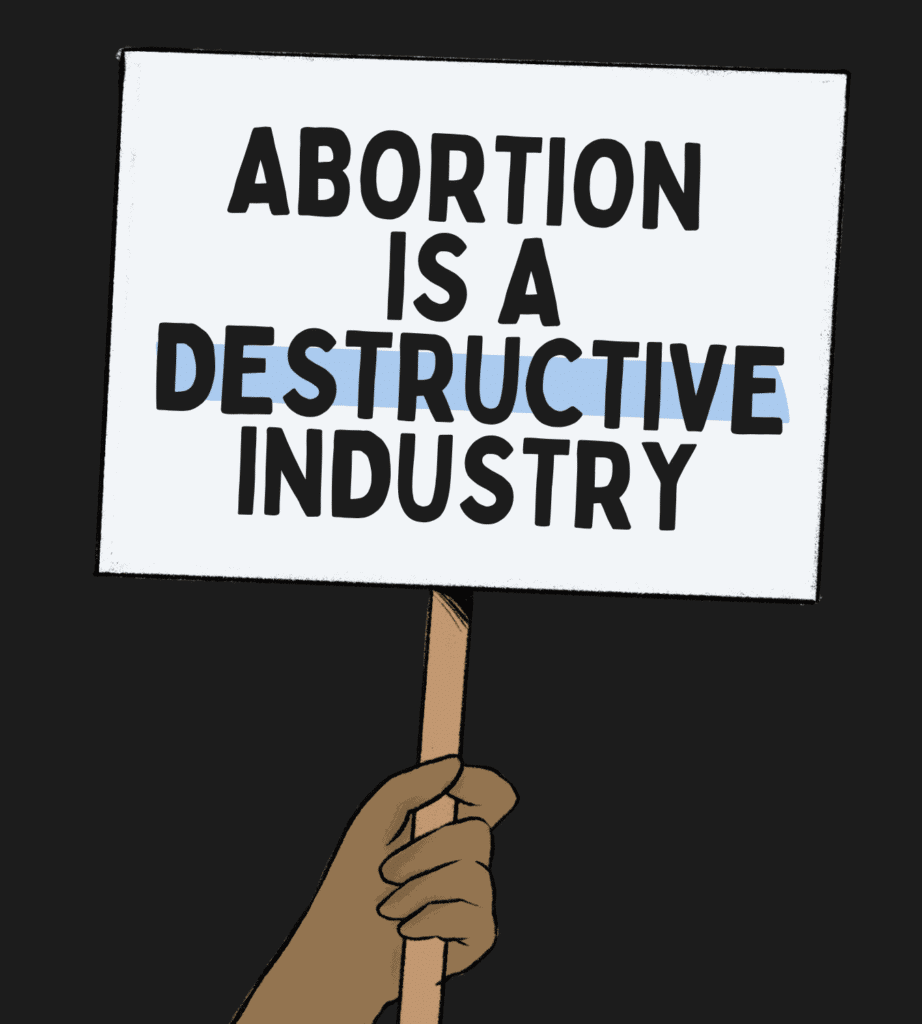A quick Google search for a crisis pregnancy center reveals that abortion advocates crowd the space, warning about “fake clinics.” The claims are vast and hostile about these organizations. Some say they only exist to coerce you into religion; others state they lie about how far along a pregnancy is to deter you from an abortion.
One of the top articles on the list is about a prominent abortion provider making claims about ill intent and false advertising from crisis pregnancy centers. Then, they say readers should visit their locations for real healthcare instead. On the other hand, crisis pregnancy centers warn that large abortion providers simply want to drive profit instead of losing business to centers. It can be hard to decipher if such large claims are the whole picture.
Behind the noise, what is a crisis pregnancy center at its core? Are they “fake” clinics posing as women’s healthcare? Here’s the truth.
A crisis pregnancy center (CPC) is a nonprofit, community-based organization that provides medical and compassionate support to women facing a difficult pregnancy decision. They began in the 1960s when abortion became legal to provide immediate and ongoing care to empower women and reveal the truth about abortion. But they have evolved since then. Now, they tend to go by “pregnancy medical clinics” or “pregnancy resource centers.” The services they offer are also more robust.

About 80 percent of staff at CPCs are volunteers, which is how most centers can run without charging women for their services. Those free services include:
Despite claims that crisis pregnancy centers don’t abide by medical regulations, CPCs have a high standard of care when serving women. Most centers affiliate with a national network – the three most prominent being Care Net, Heartbeat International and NIFLA. All affiliates have training, resources and services subject to an overarching national code of ethics instituted in 2009, “Our Commitment of Care and Competence.” This also requires all affiliates to have the following:
You’ve probably also heard that crisis pregnancy centers are anti-choice. They insist CPCs only exist to coerce women out of abortions. Then, those abortion providers will claim to offer comprehensive healthcare through their services. But the numbers tell a different story.
The nation’s largest abortion provider performs abortions as 95% of their pregnancy services (and the number is only growing). This leaves little room for any other healthcare. In addition, they only provide one adoption referral per two hundred abortions. It reveals a lot about what “choice” they’re pushing.

Sadly, it makes sense. After all, abortion clinics make an average of $580 for medication abortions and $1,500-2,000 for surgical abortions. It is their second most significant financial contributor. The first biggest? Taxpayer dollars. They made $633.4 million last year – or $1.74 million per day – through government funding. If they were about genuinely filling a need in healthcare, that money would instead go to supporting women in whatever pregnancy choice they make. Rather than helping women, they overcharge for harmful procedures and only funnel the millions of dollars they receive into the same procedure they charge for.
But again, why wouldn’t they coerce women when they make thousands of dollars on one choice and zero on the others?
In contrast, CPCs offer their services completely free. Data from 2019 shows that CPCs served close to 2 million people, with their free services and material assistance amounting to over $266 million. Only 20 percent of centers receive government funding. And yet, they put every dollar they have toward empowering women and supporting them before and after pregnancy with no charge to them. In fact, in the same year, centers gave away over 2 million baby outfits, 1.3 million packs of diapers and 30,445 car seats.
So, while abortion clinics are taking, CPCs are giving.
Something conveniently left out of anti-CPC articles is every center sees women who leave and choose abortion. And whether or not they choose life, centers still serve them with all services and even post-abortive counseling – something abortion clinics don’t offer.
Another thing that abortion clinics perform much less than CPCs are ultrasounds. Ultrasounds are one of the most crucial things to a pregnant woman: not only does it confirm her pregnancy isn’t ectopic, but it’s also inherently unbiased. Ultrasounds show her exactly what is happening in her body – there’s no way to lie about it. No way to pressure her into thinking it’s just a “clump of cells.” It shows her the whole picture and allows her to make an informed decision.
Another service unique to CPCs is abortion pill reversal (APR). It allows women to change their minds after taking the first of two abortion pills. Abortion proponents claim that APR is impossible and not a legitimate choice, but thousands of moms with saved, healthy babies would say otherwise.
If this is about giving women choices, CPCs beat out abortion clinics every time.
Crisis pregnancy centers don’t hide who they are, what they do or pregnancy information. Most information can be found on their website or by calling. They will be upfront about not providing abortions but providing services around it, such as pre-abortion screening, abortion pill reversal and post-abortion counseling. They also provide a higher quality of care for patients than abortion clinics. In studies by the journal Contraception and the Charlotte Lozier Institute:

CPCs are usually run by religious staff. However, this should provide more love and care for patients, not less. If a center’s staff is acting judgmental, pushy or deceitful, women should leave and find another. Pregnancy is not a sin and should not be treated like one.
CPCs aren’t an industry; some operate independently if they aren’t affiliated with an organization like the ones mentioned above. Think about when you go to a new doctor’s office and have a bad experience; it doesn’t mean doctors aren’t good, it just means that doctor isn’t good. Check affiliate websites with clear regulations their centers follow or visit MyChoiceNetwork.org for a list of CPCs that abide by strict codes.
The rumors floating around that crisis pregnancy centers are “fake” are completely false. Not only do they follow medical, ethical and legal standards, but they also provide more choices than abortion clinics and have higher satisfaction rates. For real, all-around, informed care, the heroes aren’t abortion clinics. They are crisis pregnancy centers.
The post The Truth: “Fake” Crisis Pregnancy Centers appeared first on Focus on the Family.
Continue reading...
One of the top articles on the list is about a prominent abortion provider making claims about ill intent and false advertising from crisis pregnancy centers. Then, they say readers should visit their locations for real healthcare instead. On the other hand, crisis pregnancy centers warn that large abortion providers simply want to drive profit instead of losing business to centers. It can be hard to decipher if such large claims are the whole picture.
Behind the noise, what is a crisis pregnancy center at its core? Are they “fake” clinics posing as women’s healthcare? Here’s the truth.
Real Healthcare
Crisis Pregnancy Center Services
A crisis pregnancy center (CPC) is a nonprofit, community-based organization that provides medical and compassionate support to women facing a difficult pregnancy decision. They began in the 1960s when abortion became legal to provide immediate and ongoing care to empower women and reveal the truth about abortion. But they have evolved since then. Now, they tend to go by “pregnancy medical clinics” or “pregnancy resource centers.” The services they offer are also more robust.

About 80 percent of staff at CPCs are volunteers, which is how most centers can run without charging women for their services. Those free services include:
- Ultrasounds
- Pregnancy tests
- Medical screenings
- Abortion pill reversal
- STD/STI testing and treatment
- Women’s counseling
- Men’s counseling
- Parenting resources
- Adoption referrals and resources
Quality Healthcare
Despite claims that crisis pregnancy centers don’t abide by medical regulations, CPCs have a high standard of care when serving women. Most centers affiliate with a national network – the three most prominent being Care Net, Heartbeat International and NIFLA. All affiliates have training, resources and services subject to an overarching national code of ethics instituted in 2009, “Our Commitment of Care and Competence.” This also requires all affiliates to have the following:
- All medical services are under the supervision and direction of a licensed physician by applicable medical standards (like HIPAA)
- Truthfulness in all communications
- Client information confidentiality and protection (as guided by federal, state and local law)
- Rigor in screening volunteers and staff
- Nondiscrimination
- Kindness to and compassion for clients
- Compliance with all legal requirements regarding employment, fundraising, financial management, taxation, public reporting and financial disclosure
Real Choices
You’ve probably also heard that crisis pregnancy centers are anti-choice. They insist CPCs only exist to coerce women out of abortions. Then, those abortion providers will claim to offer comprehensive healthcare through their services. But the numbers tell a different story.
The nation’s largest abortion provider performs abortions as 95% of their pregnancy services (and the number is only growing). This leaves little room for any other healthcare. In addition, they only provide one adoption referral per two hundred abortions. It reveals a lot about what “choice” they’re pushing.

Abortion Clinic Stats
Abortion-Focused
Sadly, it makes sense. After all, abortion clinics make an average of $580 for medication abortions and $1,500-2,000 for surgical abortions. It is their second most significant financial contributor. The first biggest? Taxpayer dollars. They made $633.4 million last year – or $1.74 million per day – through government funding. If they were about genuinely filling a need in healthcare, that money would instead go to supporting women in whatever pregnancy choice they make. Rather than helping women, they overcharge for harmful procedures and only funnel the millions of dollars they receive into the same procedure they charge for.
But again, why wouldn’t they coerce women when they make thousands of dollars on one choice and zero on the others?
Crisis Pregnancy Center Stats
In contrast, CPCs offer their services completely free. Data from 2019 shows that CPCs served close to 2 million people, with their free services and material assistance amounting to over $266 million. Only 20 percent of centers receive government funding. And yet, they put every dollar they have toward empowering women and supporting them before and after pregnancy with no charge to them. In fact, in the same year, centers gave away over 2 million baby outfits, 1.3 million packs of diapers and 30,445 car seats.
So, while abortion clinics are taking, CPCs are giving.
Women-Driven
Something conveniently left out of anti-CPC articles is every center sees women who leave and choose abortion. And whether or not they choose life, centers still serve them with all services and even post-abortive counseling – something abortion clinics don’t offer.
Another thing that abortion clinics perform much less than CPCs are ultrasounds. Ultrasounds are one of the most crucial things to a pregnant woman: not only does it confirm her pregnancy isn’t ectopic, but it’s also inherently unbiased. Ultrasounds show her exactly what is happening in her body – there’s no way to lie about it. No way to pressure her into thinking it’s just a “clump of cells.” It shows her the whole picture and allows her to make an informed decision.
CPC services have become even more urgent as the FDA has dramatically changed access to abortion pills, allowing them to be prescribed without a doctor’s visit. Through an ultrasound, women should get confirmation of pregnancy, location of pregnancy (could be ectopic) and gestational age of the baby before taking the abortion pill. All these factors could lead to severe complications or even death if a woman is unaware and takes the pill. We need more pregnancy medical clinics with expanded services, not less.
Danielle Pitzer
Another service unique to CPCs is abortion pill reversal (APR). It allows women to change their minds after taking the first of two abortion pills. Abortion proponents claim that APR is impossible and not a legitimate choice, but thousands of moms with saved, healthy babies would say otherwise.
If this is about giving women choices, CPCs beat out abortion clinics every time.
Related: Crisis Pregnancy Center Videos
Real Care
What to Expect at a Crisis Pregnancy Center
Crisis pregnancy centers don’t hide who they are, what they do or pregnancy information. Most information can be found on their website or by calling. They will be upfront about not providing abortions but providing services around it, such as pre-abortion screening, abortion pill reversal and post-abortion counseling. They also provide a higher quality of care for patients than abortion clinics. In studies by the journal Contraception and the Charlotte Lozier Institute:

- Over twice as many people had negative experiences at abortion clinics compared to CPCs
- 68 percent of CPCs offer same-day visits compared to 37 percent of abortion clinics
- 98 percent of CPCs offer services at no charge compared to 17 percent of abortion clinics
CPCs are usually run by religious staff. However, this should provide more love and care for patients, not less. If a center’s staff is acting judgmental, pushy or deceitful, women should leave and find another. Pregnancy is not a sin and should not be treated like one.
CPCs aren’t an industry; some operate independently if they aren’t affiliated with an organization like the ones mentioned above. Think about when you go to a new doctor’s office and have a bad experience; it doesn’t mean doctors aren’t good, it just means that doctor isn’t good. Check affiliate websites with clear regulations their centers follow or visit MyChoiceNetwork.org for a list of CPCs that abide by strict codes.
The rumors floating around that crisis pregnancy centers are “fake” are completely false. Not only do they follow medical, ethical and legal standards, but they also provide more choices than abortion clinics and have higher satisfaction rates. For real, all-around, informed care, the heroes aren’t abortion clinics. They are crisis pregnancy centers.
Never underestimate someone's ability to find out the truth.
Unknown
The post The Truth: “Fake” Crisis Pregnancy Centers appeared first on Focus on the Family.
Continue reading...





